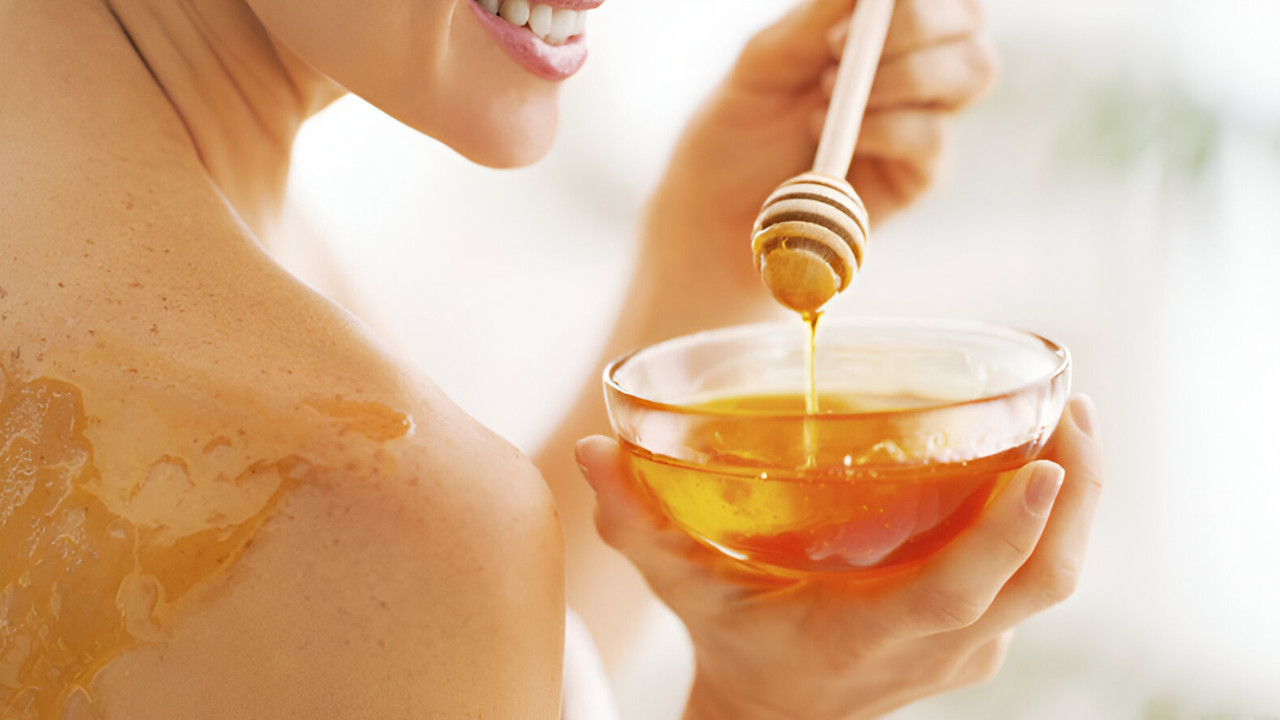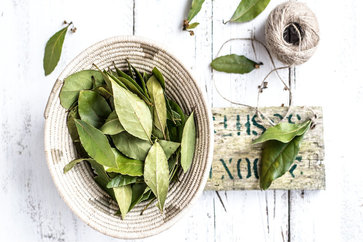In Ayurveda, honey is referred to as madhu and is celebrated for its numerous health benefits. The Sushruta Samhita identifies eight distinct types of honey: Bhramara, Pauttika, Xaudra, Chatra, Makshika, Arghya, Auddhalaka, and Dala Madhu, each with its unique properties.
Honey holds a significant place in Ayurvedic medicine due to its revered qualities. It is known for its ability to boost Ojas (the body’s vital energy and immunity), its antioxidant benefits, and its natural antibiotic and anti-inflammatory properties.
Additionally, honey serves as an Anupana (a substance that enhances the effectiveness of other herbs and treatments). Its warming nature, associated with the element Agni (digestive fire), helps to balance elevated Kapha dosha, which can lead to congestion and lethargy.
Properties of Honey in Ayurveda
Honey is considered sweet (Madhura Rasa) and is known to have a cooling effect (Shita Virya). It is also said to be heavy (Guru) and oily (Snigdha).
Dosha Balance:
- Vata Dosha: Honey is beneficial for balancing Vata dosha, as its oily and sweet qualities help to soothe the dryness and roughness associated with Vata imbalances.
- Pitta Dosha: Honey can aggravate Pitta dosha due to its heating nature, so it should be used cautiously or in moderation if one has a Pitta imbalance.
- Kapha Dosha: Honey can help to balance Kapha dosha as it has a light and drying effect, which helps counteract Kapha’s heaviness and dampness.
Digestive Benefits: Honey is considered to be good for digestion and can help to improve appetite and digestive fire (Agni). It is often used in combination with other herbs to aid in digestion and detoxification.
Healing Properties: Ayurveda views honey as a natural healer with antibacterial, anti-inflammatory, and wound-healing properties. It is used in various topical applications and as a base for medicinal preparations.
Usage Guidelines:
- Raw vs. Processed: Raw honey is preferred in Ayurveda because it is believed to retain more of its beneficial properties.
- Heating Honey: Ayurveda advises against heating honey, as it is believed that heating can alter its properties and make it less beneficial or even harmful.
Applications:
- Internal Use: Honey can be taken with warm water or herbal teas to soothe the throat and aid digestion.
- External Use: It is commonly used in masks, poultices, and ointments for its soothing and healing effects on the skin.
In summary, honey is a cherished component in Ayurvedic medicine, appreciated for its ability to balance doshas, support digestion, and provide healing benefits. However, its use should be tailored to an individual’s specific doshic balance and health needs.
Beneficial Properties for Skin
Honey’s beneficial properties for skin are well-recognized in both traditional and modern skincare. Its natural hydration, soothing, and healing qualities make it an exceptional ingredient for promoting healthy, radiant skin. Below are some benefits of its properties.
1. Honey Moisturizing Mask
Humectant: Honey’s ability to attract moisture makes it an exceptional hydrating agent. When applied to the skin, it draws water from the air into the outer layer of the skin, helping to maintain a hydrated and plump appearance.
This can be particularly beneficial for those with dry or flaky skin, as it helps to restore and lock in moisture, leaving the skin feeling soft and supple. Regular use of honey in masks and moisturizers can improve the overall texture and elasticity of the skin.
Honey Moisturizing Mask:
- Ingredients: 1-2 tablespoons of raw honey.
- Instructions: Apply a thin layer of honey directly to clean, dry skin. Leave it on for 15-20 minutes. Rinse with warm water and pat dry. For added hydration, you can mix honey with a few drops of your favorite carrier oil (e.g., coconut or almond oil).
Honey and Aloe Vera Gel:
- Ingredients: 1 tablespoon honey, 1 tablespoon aloe vera gel.
- Instructions: Mix honey and aloe vera gel together and apply to the face. Leave it on for 15-20 minutes before rinsing with warm water. Aloe vera adds extra hydration and soothing properties.
2. Antibacterial and Antimicrobial
Wound Healing: The natural antibacterial properties of honey help create an environment that inhibits bacterial growth. This makes honey effective in treating minor wounds and burns by reducing the risk of infection and accelerating the healing process.
Its antimicrobial nature can also help in preventing and treating acne, as it can reduce the presence of acne-causing bacteria on the skin.
Acne Treatment: Honey’s ability to reduce inflammation and kill bacteria makes it a valuable addition to acne treatment routines. It can help to clear clogged pores and reduce redness, leading to fewer breakouts and a smoother complexion.
Honey can be used as a spot treatment or incorporated into face masks to help manage acne-prone skin.
Honey Spot Treatment:
- Ingredients: Raw honey.
- Instructions: Dab a small amount of honey directly onto acne spots or minor wounds. Leave it on overnight and rinse off in the morning. For acne, you can also mix honey with a few drops of tea tree oil for enhanced antibacterial effects.
Honey and Turmeric Paste:
- Ingredients: 1 tablespoon honey, 1/2 teaspoon turmeric powder.
- Instructions: Mix honey and turmeric to form a paste. Apply it to acne-prone areas or minor skin irritations. Leave it on for 10-15 minutes, then rinse off. Turmeric adds additional anti-inflammatory and antibacterial benefits.
3. Antioxidant Protection
Free Radical Scavenging: The antioxidants present in honey, including flavonoids and phenolic acids, play a crucial role in protecting the skin from oxidative damage caused by free radicals.
This protection helps to prevent premature aging and reduces the risk of developing fine lines and wrinkles. Honey’s antioxidant properties also contribute to a more radiant and youthful complexion by combating environmental stressors and pollution.
Honey and Green Tea Antioxidant Mask:
- Ingredients: 1 tablespoon honey, 1 tablespoon brewed green tea (cooled).
- Instructions: Mix honey with cooled green tea and apply to the face. Leave it on for 15-20 minutes. Rinse with lukewarm water. Green tea enhances honey’s antioxidant properties, providing additional protection against free radicals.
Honey and Vitamin C Serum:
- Ingredients: 1 tablespoon honey, 1/2 teaspoon vitamin C powder.
- Instructions: Dissolve vitamin C powder in honey and apply to the face. Leave it on for 10-15 minutes before rinsing off. Vitamin C adds extra antioxidant protection and brightening effects.
4. Exfoliation
Gentle Exfoliant: Honey’s natural enzymes, when combined with other exfoliating agents like sugar or oatmeal, provide a mild yet effective exfoliation. This process helps to slough off dead skin cells, unclog pores, and reveal fresh, new skin underneath.
Regular exfoliation with honey-based scrubs can enhance skin texture, reduce dullness, and promote a more even skin tone without the harshness of chemical exfoliants.
Honey and Sugar Scrub:
- Ingredients: 1 tablespoon honey, 1 tablespoon granulated sugar.
- Instructions: Mix honey and sugar. Gently massage the mixture onto your face in circular motions. Rinse with warm water. This scrub helps to exfoliate dead skin cells and reveal a smoother complexion.
Honey and Oatmeal Exfoliating Mask:
- Ingredients: 1 tablespoon honey, 2 tablespoons finely ground oatmeal.
- Instructions: Combine honey and oatmeal to form a paste. Apply to the face, gently scrubbing in circular motions. Leave it on for 10-15 minutes before rinsing. Oatmeal provides gentle exfoliation and soothing effects.
5. Skin Soothing
Anti-Inflammatory: Honey’s anti-inflammatory properties make it an excellent remedy for calming irritated or inflamed skin. It can soothe conditions like eczema, psoriasis, and rosacea, reducing redness and discomfort.
By applying honey to inflamed areas, you can experience relief from itching and irritation, leading to a more comfortable and balanced skin condition.
Honey and Yogurt Soothing Mask:
- Ingredients: 1 tablespoon honey, 1 tablespoon plain yogurt.
- Instructions: Mix honey and yogurt and apply to the face. Leave it on for 15-20 minutes before rinsing with warm water. Yogurt adds probiotics and soothing properties to the mask.
Honey and Chamomile Tea Compress:
- Ingredients: 1 tablespoon honey, 1 chamomile tea bag.
- Instructions: Brew chamomile tea and let it cool. Mix a small amount of honey into the tea. Soak a cotton pad in the mixture and apply to irritated areas. Leave on for 10-15 minutes. Chamomile adds calming and anti-inflammatory benefits.
6. Anti-Aging
Firmness and Elasticity: The moisturizing and nourishing effects of honey contribute to improved skin elasticity and firmness. By promoting hydration and supporting the skin’s natural repair processes, honey helps to reduce the appearance of fine lines and wrinkles.
Over time, this can lead to a more youthful and resilient complexion, as honey supports the skin’s ability to maintain its structure and vitality.
Honey and Avocado Anti-Aging Mask:
- Ingredients: 1 tablespoon honey, 1/4 ripe avocado.
- Instructions: Mash the avocado and mix with honey. Apply to the face and leave on for 15-20 minutes before rinsing. Avocado provides additional nourishment and healthy fats for anti-aging benefits.
Honey and Banana Wrinkle-Fighting Mask:
- Ingredients: 1 tablespoon honey, 1/2 ripe banana.
- Instructions: Mash the banana and mix with honey. Apply to the face and leave on for 15-20 minutes. Rinse with warm water. Bananas are rich in vitamins and minerals that help improve skin elasticity.
7. Brightening
Radiance Boost: Honey’s natural enzymes and antioxidants help to brighten the complexion and diminish signs of dullness. By gently exfoliating and nourishing the skin, honey can help to even out skin tone and enhance overall radiance.
Regular use of honey in face masks or treatments can lead to a more luminous and glowing appearance, making it a popular choice for those looking to refresh and revitalize their skin.
Honey and Lemon Brightening Mask:
- Ingredients: 1 tablespoon honey, 1 teaspoon fresh lemon juice.
- Instructions: Mix honey and lemon juice together. Apply to the face and leave on for 10-15 minutes. Rinse off with lukewarm water. Lemon juice adds natural brightening effects, but be cautious if you have sensitive skin as it can be irritating.
Honey and Papaya Brightening Mask:
- Ingredients: 1 tablespoon honey, 2 tablespoons mashed ripe papaya.
- Instructions: Mix honey with mashed papaya. Apply to the face and leave on for 15-20 minutes before rinsing. Papaya contains enzymes that help to gently exfoliate and brighten the skin.
8. Balancing
pH Balance: Honey helps to maintain the skin’s natural pH balance, which is essential for overall skin health. A balanced pH level supports the skin’s protective barrier, preventing excessive dryness or oiliness.
By keeping the skin’s pH level in check, honey helps to control excess oil production, reduce acne outbreaks, and promote a more balanced and stable complexion.
Honey and Apple Cider Vinegar Balancing Toner:
- Ingredients: 1 tablespoon honey, 1 tablespoon apple cider vinegar, 1/2 cup water.
- Instructions: Mix honey and apple cider vinegar with water. Apply to the face using a cotton pad as a toner. This mixture helps balance the skin’s pH and control oil production.
Honey and Green Tea Balancing Toner:
- Ingredients: 1 tablespoon honey, 1/2 cup brewed green tea (cooled).
- Instructions: Combine honey with cooled green tea. Apply to the face with a cotton pad. This toner helps balance skin while providing additional antioxidants.
9. Healing
Scar Reduction: Honey’s healing properties extend to improving the appearance of scars and blemishes. Its ability to promote cell regeneration and repair damaged skin helps to reduce the visibility of scars over time.
Regular application of honey to scarred areas can support the skin’s natural healing process, leading to smoother and more even skin texture.
Honey and Aloe Vera Healing Gel:
- Ingredients: 1 tablespoon honey, 1 tablespoon aloe vera gel.
- Instructions: Mix honey with aloe vera gel and apply to minor cuts, burns, or dry patches. Leave it on until it dries, then rinse or leave it overnight. Aloe vera adds additional soothing and healing properties.
Honey and Calendula Healing Mask:
- Ingredients: 1 tablespoon honey, 1 tablespoon calendula oil or infused calendula tea.
- Instructions: Mix honey with calendula oil or tea. Apply to affected areas or use as a face mask. Calendula has additional healing and soothing properties that complement honey.
10. Nourishment
Vitamins and Minerals: Honey is rich in essential vitamins and minerals that contribute to overall skin health. B vitamins, such as B5 (pantothenic acid) and B6 (pyridoxine), support skin repair and regeneration, while vitamin C provides antioxidant protection and boosts collagen production.
Minerals like calcium and magnesium help to maintain skin health and function, making honey a nourishing addition to skincare routines.
Honey and Jojoba Oil Nourishing Mask:
- Ingredients: 1 tablespoon honey, 1 tablespoon jojoba oil.
- Instructions: Combine honey and jojoba oil. Apply to the face and leave on for 15-20 minutes before rinsing. Jojoba oil provides additional nutrients and helps nourish the skin.
Honey and Almond Oil Nourishing Blend:
- Ingredients: 1 tablespoon honey, 1 tablespoon almond oil.
- Instructions: Mix honey with almond oil and apply to the face. Leave on for 15-20 minutes. Rinse with warm water. Almond oil adds extra vitamins and minerals, enhancing the nourishing effects of honey.
These methods allow you to harness the various skin benefits of honey in a targeted way, addressing hydration, soothing, exfoliation, and more.
Note: Always remember to patch-test any new ingredient or mixture on a small area of skin to ensure you don’t have an adverse reaction, especially if you have sensitive skin.
Incorporating honey into your skincare regimen can offer a wide range of benefits, from deep hydration and soothing relief to antioxidant protection and enhanced radiance. Whether used in masks or scrubs.




























Honey-regarded as the superfood in Ayurveda has many beneficial uses in maintaining inner and outer health and beauty of a human body. including honey in your diet and in skin care routine is only going to benefit us in long term.
This blog is very informative and has an innovative approach towards explaining the uses of honey for skin, hair and body care regimen.
Thank you for sharing such amazing use of honey for hair and skin. I have been suffering from skin issues myself and your tips will be of great help. Keep sharing!